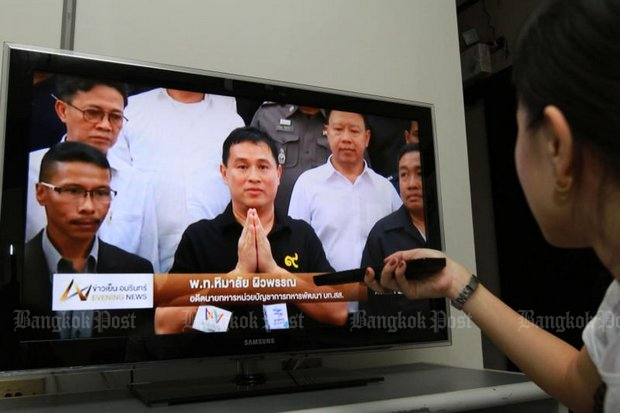
Prime Minister Prayut Chan-o-cha has brushed aside digital TV operators' renewed request for more state assistance to ease broadcasters' financial burden and business difficulties.
In brief remarks on Tuesday, Gen Prayut said the issue falls under the purview of the currently moribund National Broadcasting and Telecommunications Commission (NBTC).
The Digital TV Operators Association, led by president Suparp Kleekachai, submitted a proposal Tuesday to the Media Reform Committee to help mediate talks with the NBTC and the government.
Mr Suparp said that all the association wants is support to shore up the struggling digital TV industry.
According to the association's proposal, the NBTC and government are being asked to help subsidise the broadcasting networks or multiplex (MUX) costs that are due in January 2018 and to waive all remaining licence fees starting from the May 2018 payment.
They were also asked to expropriate the 450-700 megahertz spectrum range and auction it off to raise funding for the requested subsidy.
Additionally, the association urged the NBTC and the government to amend the existing digital TV development roadmap, which envisions expanding the number of digital TV channels to 48, a number they say is too high.
According to Mr Suparp, another reason the association came to submit the proposal is to make the government more aware of the plight of traditional media such as TV and print, detailing the lack of future prospects for digital TV if financial constraints are left unaddressed.
Unemployment and negative effects on the country's economy will ensue accordingly, Mr Suparp said.
"The association doesn't want to take advantage of the NBTC or government, but the digital TV industry is very fragile and it needs a lot of support," he said.
Adisak Limparungpatanakij, the working committee chief of the association and former president of Nation Broadcasting Corporation, said that reallocation of the 450-700MHz spectrum range for telecom service usage is vital to the digital TV industry because the NBTC will earn a massive amount of money that can be used to subsidise the finances of digital TV operators.
"It's called spectrum reframing and it will benefit digital TV operators and stakeholders while the government earns more revenue -- creating a win-win situation," Mr Adisak said.
Mr Adisak, however, reaffirmed that the highest financial burden factors for most digital TV operators during the three years of operation are the MUX rental fees of 2.5 billion baht per year and the digital TV licence fees.
"The NBTC should subsidise all of the MUX rental fees and the remaining digital TV licence fee, worth a combined 16 billion baht, to take responsibility for failing to facilitate the smooth transition of digital TV as promised," Mr Adisak said.
Nevertheless, NBTC secretary-general Takorn Tantasith said it would be difficult for the NBTC to deliver on the association's request, as it would conflict with existing laws and regulations, including the conditions of the digital TV licence auctions.
For the NBTC to subsidise the MUX rental fee or even waive all remaining licence fees, it could put the regulator at risk of legal backlash because the action would infringe on state benefits.
Mr Takorn refused to elaborate further on the issue, saying more discussion with related state agencies is necessary.